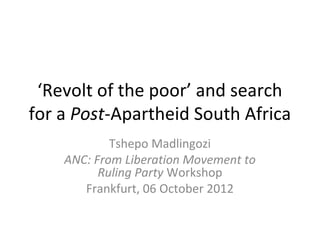
Submission of Presentation made by Tshepo Madlingozi at the 6 October 2012 Seminar in Frankfurt, Germany
- 1. ‘Revolt of the poor’ and search for a Post-Apartheid South Africa Tshepo Madlingozi ANC: From Liberation Movement to Ruling Party Workshop Frankfurt, 06 October 2012
- 2. ANC: 1960-1980- Obscurity • ANC Banned - leaders in exile or jail; underground structures weak • Military campaign ineffective • White civil society in cooperation with Apartheid government. For Blacks, only welfare CSO’s allowed • International support lukewarm • Soweto Uprising in 1976 revitalises oppositional politics
- 3. 1980-1990: ANC’s Leadership of Struggle • As the most established structure, ANC absorbs the thousands of 1976 militants fleeing SA • ANC Benefits from injection of young radical recruits • International Anti-Apartheid Campaign intensifies (Sanctions, cultural boycotts etc.) • Switch to ‘civil rights’ language (ANC Constitutional Principles in 1989)
- 4. The UNITED DEMOCRATIC FRONT
- 5. Civics and “People’s Power” • Mid-1980s “civics” injected widespread radical political agency through ‘insurrections’ • ‘Insurrection’ against local apartheid control & harsh economic policies • Mutual sharing and diffusion of radical tactics renders country “ungovernable • Many legal advocacy organisations also founded
- 6. The People Shall Govern
- 8. ANC: 1990-1994 • Returning ANC assumes leadership of the Mass Democratic Movement • Exiles vs ‘in-xiles’: secrecy, paranoid and democracy centralism • ‘Nationalisation is our policy’ Mandela, 1990 • February 1991 UDF disbands • ‘Civic movement’ forced to demobilise and assimilate into ANC branches • ‘We have never been socialist’ Mandela, 1991
- 10. Post-94: Hollowing out of ‘civic society’ • 1992 South African National Civic Organisation formed to focus on ‘local development’ • Biggest ‘civil society’ group, COSATU (3 million members) enter into tripartite alliance with ANC • Funding patterns favour “democracy-building” NGOs • By 1996 there were 98, 000 ‘civil society’ organisations – majority in housing, development and housing. • Civil society dominated by formal NGOs, research organisations and legal advocacy organisation
- 11. 1996: Shifting GEARs • First social movements: Coalition of Gays and Lesbian Equality (1994); Khulumani (1995), Treatment Action Campaign (1998) • 1996 Mandela imposes an austerity programme – Growth, Employment and Redistribution (GEAR) – “non-negotiable” • Under GEAR: privatisation and outsourcing (retrenchments in public service); liberalisation of economy (massive retrenchments in textile sector) • 1998: Cut-backs in local government funding: water and electricity cut-offs and thousands of evictions
- 12. 2000: Soweto Electricity Crisis Committee, Anti- Privatisation Forum, Mandela-Park Backyard Dwellers
- 13. 2001: Western Cape Anti-Eviction Committee and Durban’s Concerned Citizen Forum
- 14. Anatomy of Local movements • Membership: unemployed or precariously employed township residents • Funding: membership fees and donations by leftist intellectuals and NGOs. • Ideology: Claimed Marxism and socialism. • Tactics: street barricades, re-connection of services, forceful reinstalment into homes, disruptive marches and vandalism of state property • Goals: increased social welfare in the short term; in the long term “decommodification” and “socialism”
- 15. State Response: MARGINALISATION AND CRIMINALISATIONS • Vilification (“white lackeys”, counter- revolutionaries”, enemies of the people”) • Counter-movements • Co-optation • Criminalisation & suppression
- 16. State repression
- 17. “Rebellion of the poor” • Mid-2000: most social movements destroyed by (a) State repression; (b) strategic confusion; (c) internal in-fighting • From mid-2000 – the rise of “service delivery” protests • Difference between ‘established’ social movements and “service delivery” protests: - “spontaneous”; un-organised; issue-specific; more violent
- 18. Community Protesters take over
- 19. Local unrest and democracy • Revolts lasts for 4 days: end because of state repression; meeting with senior ANC leaders; promise made or lack of media attention • 10-year “rebellion of the poor” has had minimal impact • Good: highlighted corruption; exposes lack of service-delivery and failure of local government • Bad: ‘perpetual mobilisation’ means can be mobilised for negative things
- 20. ANC degenerates
- 21. ANC ‘for sale’
- 22. POST-COLONIAL ECONOMIC EXCLUSION • Increasing Urban Poverty: 48% living below the poverty line (39 euros/month). • Chronic unemployment: Officially 23% (42%) • Entrenched Inequality: average black worker USD 1 524, average white worker earns USD 8 270 • Poor basic service delivery, commercialisation & policies of cost-recovery
- 23. POST-COLONIAL POLITICAL EXCLUSION • Local councillors more accountable to party leaders than local communities • Ward committees ‘colonised’ & ‘hijacked’ by political parties and intra-party factions • No proper consultation when drafting local Integrated Development Programmes and local budgets • Party leaders, business leaders and state officials & other elites dominate
- 25. Three key issues • Land Redistribution • Racial equality • Social justice (access to employment, basic services, transformation of masculinities)
- 26. Wither ‘Civil society’? • March 2011: 76,175 “non-profit organisations” • Provincial spread: Gauteng (32 per cent) and KwaZulu-Natal (20 per cent); Free State, Mpumalanga and North West (at 6 per cent). • Sectoral spread: Most of the NPOs are in the social services sector (34 per cent),then community development and housing (21 per cent), then religion (12 per cent) and education and research (11 per cent) • Biggest growth: professional business org’s (28%); legal advocacy org’s (22%)
- 27. What is to be done? • ‘Civil society’ dominated by “Non-governmental organisations”: middle-class staff, well-resourced offices, and “in-system” tactics (publish a lot, media campaigns and litigation) • No substantive uncertainty • Mass-based, popular movements need to be revitalised and supported • ‘Community revolts’ need to become movements; and co-ordinate at a national level • Solidarity, not charity……
